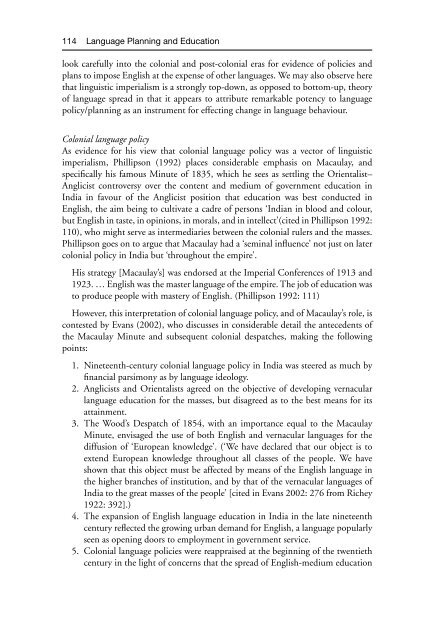Gibson Ferguson Language Planning and Education Edinburgh ...
Gibson Ferguson Language Planning and Education Edinburgh ...
Gibson Ferguson Language Planning and Education Edinburgh ...
Create successful ePaper yourself
Turn your PDF publications into a flip-book with our unique Google optimized e-Paper software.
114 <strong>Language</strong> <strong>Planning</strong> <strong>and</strong> <strong>Education</strong><br />
look carefully into the colonial <strong>and</strong> post-colonial eras for evidence of policies <strong>and</strong><br />
plans to impose English at the expense of other languages. We may also observe here<br />
that linguistic imperialism is a strongly top-down, as opposed to bottom-up, theory<br />
of language spread in that it appears to attribute remarkable potency to language<br />
policy/planning as an instrument for effecting change in language behaviour.<br />
Colonial language policy<br />
As evidence for his view that colonial language policy was a vector of linguistic<br />
imperialism, Phillipson (1992) places considerable emphasis on Macaulay, <strong>and</strong><br />
specifically his famous Minute of 1835, which he sees as settling the Orientalist–<br />
Anglicist controversy over the content <strong>and</strong> medium of government education in<br />
India in favour of the Anglicist position that education was best conducted in<br />
English, the aim being to cultivate a cadre of persons ‘Indian in blood <strong>and</strong> colour,<br />
but English in taste, in opinions, in morals, <strong>and</strong> in intellect’(cited in Phillipson 1992:<br />
110), who might serve as intermediaries between the colonial rulers <strong>and</strong> the masses.<br />
Phillipson goes on to argue that Macaulay had a ‘seminal influence’ not just on later<br />
colonial policy in India but ‘throughout the empire’.<br />
His strategy [Macaulay’s] was endorsed at the Imperial Conferences of 1913 <strong>and</strong><br />
1923. … English was the master language of the empire. The job of education was<br />
to produce people with mastery of English. (Phillipson 1992: 111)<br />
However, this interpretation of colonial language policy, <strong>and</strong> of Macaulay’s role, is<br />
contested by Evans (2002), who discusses in considerable detail the antecedents of<br />
the Macaulay Minute <strong>and</strong> subsequent colonial despatches, making the following<br />
points:<br />
1. Nineteenth-century colonial language policy in India was steered as much by<br />
financial parsimony as by language ideology.<br />
2. Anglicists <strong>and</strong> Orientalists agreed on the objective of developing vernacular<br />
language education for the masses, but disagreed as to the best means for its<br />
attainment.<br />
3. The Wood’s Despatch of 1854, with an importance equal to the Macaulay<br />
Minute, envisaged the use of both English <strong>and</strong> vernacular languages for the<br />
diffusion of ‘European knowledge’. (‘We have declared that our object is to<br />
extend European knowledge throughout all classes of the people. We have<br />
shown that this object must be affected by means of the English language in<br />
the higher branches of institution, <strong>and</strong> by that of the vernacular languages of<br />
India to the great masses of the people’ [cited in Evans 2002: 276 from Richey<br />
1922: 392].)<br />
4. The expansion of English language education in India in the late nineteenth<br />
century reflected the growing urban dem<strong>and</strong> for English, a language popularly<br />
seen as opening doors to employment in government service.<br />
5. Colonial language policies were reappraised at the beginning of the twentieth<br />
century in the light of concerns that the spread of English-medium education






